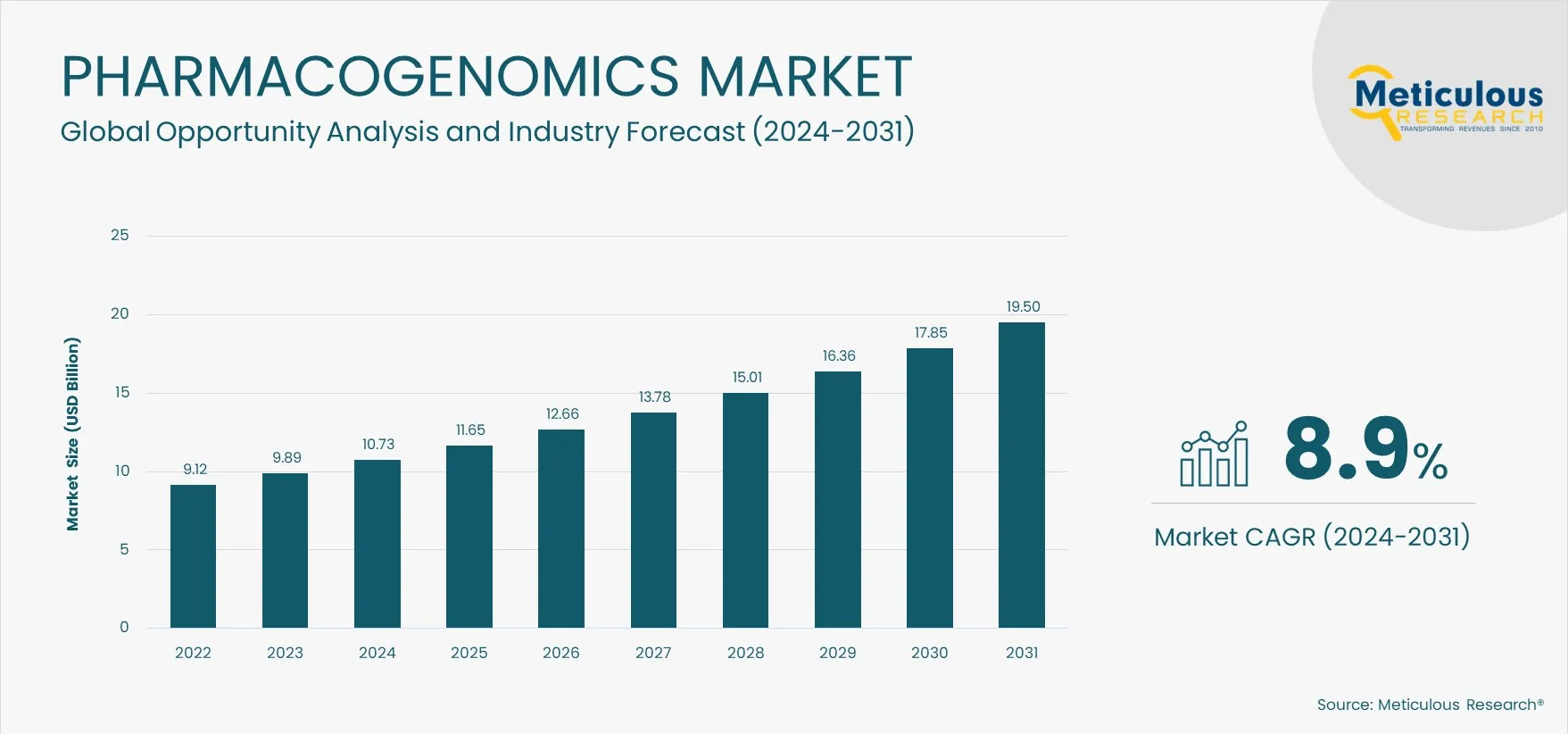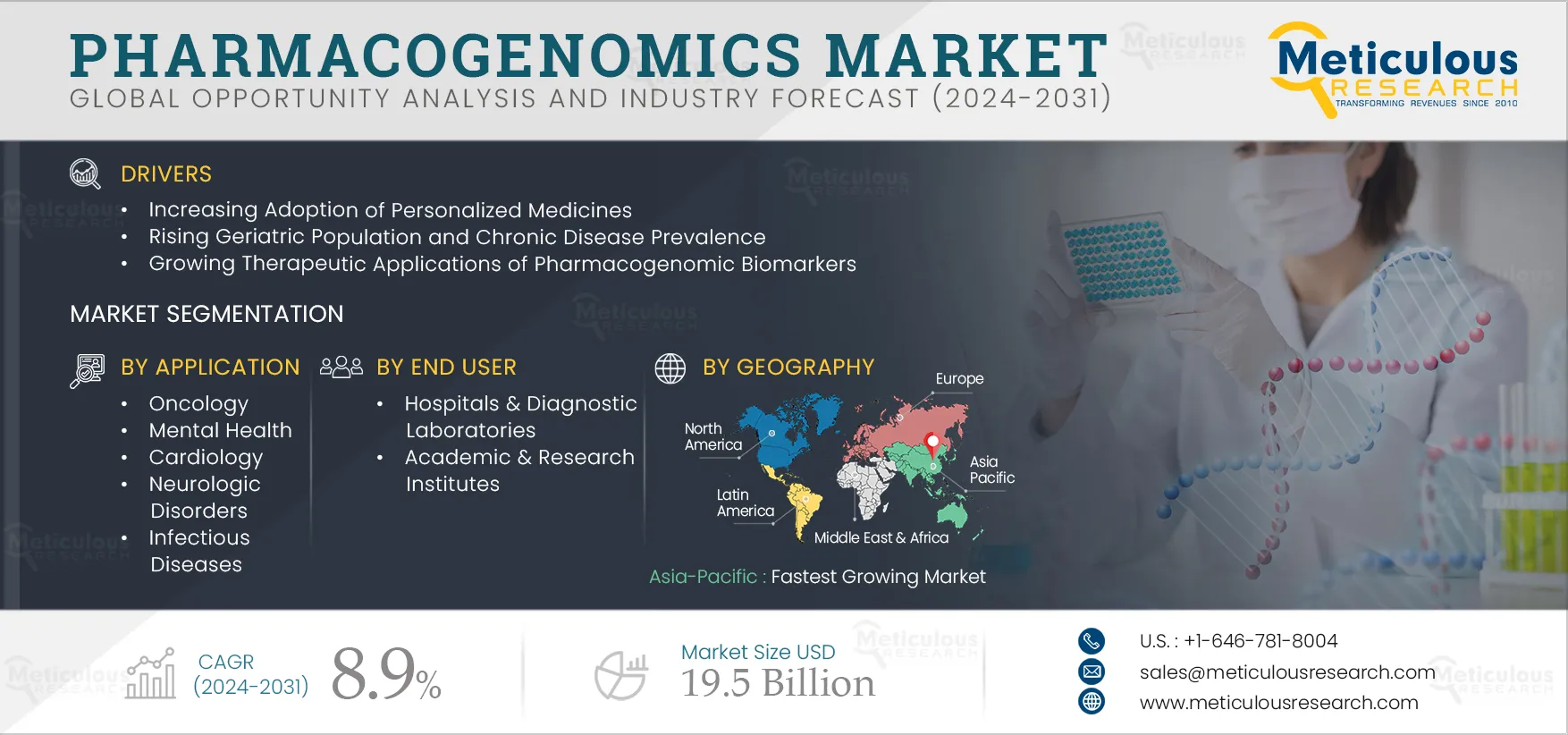The Pharmacogenomics Market is projected to reach $19.5 billion by 2031, at a CAGR of 8.9% during the forecast period 2024–2031. The pharmacogenomics market includes consumables, instruments, and software & services. The pharmacogenomics market is driven by the growing therapeutic applications of pharmacogenomic biomarkers, the increasing adoption of personalized medicines, the rising geriatric population and chronic disease prevalence, and the U.S. FDA’s and EMA’s recommendations for using pharmacogenomic data in drug discovery & development. The increasing application of pharmacogenomics in the treatment of neurological disorders and cancers, the development of new, more advanced diagnostic tools with improved accuracy, and growing awareness regarding adverse drug reactions are expected to generate growth opportunities for the stakeholders in this market.
Here are the top 10 companies operating in the Pharmacogenomics Market
Thermo Fisher Scientific Inc. (U.S.)
Founded in 1956 and headquartered in Massachusetts, U.S., Thermo Fisher offers products and services to the pharmaceutical, biotechnology, agricultural, clinical, healthcare, government, and academic sectors. The company operates through four segments: Life Sciences Solutions, Analytical Instruments, Specialty Diagnostics, and Laboratory Products and Biopharma Services.
The company operates in the pharmacogenomics market through the Life Sciences Solutions and Analytical Instruments segments. The company offers PCR, sequencing, and microarray solutions, consumables, instruments, mass spectrometry solutions, and software in the pharmacogenomics market.
The company has a strong geographic presence across North America, Europe, Asia-Pacific, Latin America, and the Middle East & Africa through its subsidiaries, R&D sites, and distribution network. Thermo Fisher primarily sells its products in the pharmacogenomics market through a direct sales force, customer-service professionals, e-commerce platforms, and third-party distributors. Some of its major subsidiaries are Fisher Scientific International, Inc. (U.S.), Thermo Fisher Scientific Australia Pty Ltd (Australia), Patheon Life Science Products International GmbH (Austria), Thermo Life Sciences AB (Sweden), and Life Sciences International Holdings BV (Netherlands).
Agilient Technologies, Inc. (U.S.)
F Incorporated in 1999 and headquartered in California, U.S., Agilent Technologies, Inc. is engaged in testing and creating innovative technology. The company offers certain application-focused solutions such as software, consumables, services, and instruments for laboratory workflow. The company operates through three business segments, namely, Life Sciences and Applied Market, Diagnostics and Genomics Business, and Agilent CrossLab.
The company operates in the pharmacogenomics market through its Diagnostics, Genomics, Life Sciences, and Applied Market business segments. The company offers software, consumables, instruments, and reagents to analyze nucleic acid material, companion diagnostics and PCR solutions, and nucleic acid purification and extraction solutions for the pharmacogenomics market.
Agilent Technologies, Inc. sells its diagnostics and genomics products primarily through direct sale channels and also through resellers, e-commerce platforms, distributors, and manufacturers’ representatives. The company manufactures its genomics and diagnostics products in the U.S. including in California, Colorado, Iowa, and Texas. Furthermore, the company has manufacturing facilities in countries such as China, Denmark, Germany, and Malaysia.
Some of the major subsidiaries of the company are Agilent Technologies Australia Pty Ltd (Australia), Agilent Technologies Italia S.p.A. (Italy), Agilent Technologies Rhone SarL (Singapore), and Agilent Technologies Deutschland Holding GmbH (Germany).
Illumina, Inc. (U.S.)
Founded in 1998 and headquartered in California, U.S., Illumina is a provider of sequencing- and array-based solutions for genomic and genetic analysis. The company offers integrated sequencing and microarray systems, consumables, and analysis tools used by genomic research centers, academic institutions, government laboratories, and hospitals, as well as pharmaceutical, biotechnology, commercial molecular diagnostic laboratories, and consumer genomics companies. The company operates through two reportable segments: Core Illumina and GRAIL. The Core Illumina segment offers solutions for the analysis of genetic material. The GRAIL business segment offers solutions for early detection of cancer. The company operates in the pharmacogenomics market through its Core Illumina business segment by offering instruments, consumables, and software.
Illumina provides its solutions to government laboratories, genomic research centers, academic institutions, hospitals, commercial molecular diagnostics laboratories, and pharmaceutical and consumer genomics companies. The company has manufacturing sites and laboratories in the U.S., Singapore, and the U.K.
Illumina distributes its products in North America, Europe, Latin America, Asia-Pacific, and the Middle East & Africa through its distributors. Some of its major subsidiaries are Illumina GmbH (Germany), Illumina Australia Pty. Ltd. (Australia), Illumina UK, Ltd. (U.K.), Illumina Italy S.r.l. (Italy), Illumina Netherlands B.V. (Netherlands), and Illumina K.K. Japan (Japan).
Qiagen N.V. (Netherlands)
Founded in 1984 and headquartered in Venlo, Netherlands, Qiagen N.V. is one of the leading providers of sample and assay technologies for molecular diagnostics, applied testing, and academic and pharmaceutical research. The company operates in five product groups, namely, Sample Technologies, Diagnostic Solutions, PCR / Nucleic Acid Amplification, Genomics / NGS, and Others. The company markets its products through two business segments: Molecular Diagnostic Products and Life Sciences Products.
Qiagen N.V. operates in the pharmacogenomics market through the PCR/Nucleic acid amplification, Diagnostic Solutions, and Genomics/NGS categories. The PCR/Nucleic acid amplification product category consists of PCR consumables, Human ID/Forensics assay consumables, PCR instruments, and OEM consumables.
The company markets products in more than 130 countries across the globe. The company has facilities in the U.S., China, Germany, Poland, the Philippines, Denmark, Romania, Spain, the U.K., and other countries. Furthermore, the company’s sales are handled by distributors and sales subsidiaries. It also sells products directly to customers. In the Americas, Europe, Asia, and Australia, the subsidiaries mainly take care of sales.
Some of the major subsidiaries of the company are Qiagen AB (Sweden), Qiagen AG (Sweden), Qiagen GmbH (Germany), QIAGEN LLC (U.S.), QIAGEN China (Shanghai) Co. Ltd. (China), QIAGEN Inc. (Canada), QIAGEN K.K. (Japan), and QIAGEN S.r.l. (Italy).
Danaher Corporation (U.S.)
Founded in 1984 and headquartered in Washington, D.C., U.S., Danaher Corporation is a science and technology company. It comprises more than 20 operating companies with positions in life sciences, diagnostics, environmental, and applied sectors, organized into four segments: Biotechnology, Life Sciences, Diagnostics, and Environmental & Applied Solutions. Pharmacogenomics products such as instruments, genomic sample preparation, and consumables are offered under the Life Sciences and Diagnostics business segment.
The company has facilities in over 60 countries, including approximately 244 administrative, sales, R&D, manufacturing, and distribution facilities. Out of these, 90 facilities are in the U.S. in over 20 states, and 154 are located outside the U.S., primarily in Europe and a lesser extent, in Asia, South America, Canada, and Australia. The subsidiaries providing pharmacogenomics products include Phenomenex Inc. (U.S.), Integrated DNA Technologies, Inc. (U.S.), Cepheid (U.S.), Aldevron Fargo (U.S.), Cytiva (U.S.), Beckman Coulter Life Sciences (U.S.), and Molecular Devices, LLC. (U.S.).
Bio-Rad Laboratories, Inc. (U.S.)
Founded in 1952 and headquartered in California, U.S., Bio-Rad Laboratories, Inc. is engaged in developing, manufacturing, and marketing products for life science research and clinical diagnosis. The company’s products and solutions are based on technologies to separate, purify, identify, analyze, and amplify biological materials, such as cells, bacteria, antibodies, proteins, and nucleic acids. Bio-Rad Laboratories operates through two business segments: Life Science and Clinical Diagnostics. The company operates in the pharmacogenomics market through both business segments. The company offers solutions for purification, separation, and amplification of genetic material for the pharmacogenomics market.
The company has manufacturing and distribution facilities in the western U.S., France, Switzerland, Germany, and Singapore. Bio-Rad Laboratories has direct distribution channels in over 35 countries outside the U.S. through its subsidiaries. Some of its subsidiaries are Bio-Rad (Shanghai), Life Science Research & Development Co., Ltd. (China), Bio-Rad Laboratórios Brasil Ltda. (Brazil), BioRad Laboratories S.r.l. (Italy), Bio-Rad Laboratories AG (Switzerland), and Bio-Rad Laboratories Limited (U.K.).
PerkinElmer, Inc. (U.S.)
Founded in 1937 and headquartered in Massachusetts, U.S., PerkinElmer is a multinational company that offers products, solutions, and services for the life sciences, diagnostics, and applied markets. The company’s split out of the diagnostics and life sciences business is now rebranded as Revvity Inc. It operates through two reportable business segments: Discovery & Analytical Solutions and Diagnostics. Pharmacogenomics products are offered through both these segments. The company offers mass spectrometry solutions, NGS consumables, and solutions for nucleic acid isolation and amplification for the pharmacogenomics market.
The company’s manufacturing and R&D facilities are in several countries, including the U.S., China, Japan, and Germany. Furthermore, the company has a strong network of sales and marketing channels and service personnel in over 38 countries and sells its products and services in over 190 countries.
PerkinElmer sells products and services predominantly through its distributors. Some of its subsidiaries are PerkinElmer Genetics, Inc. (U.S.), PerkinElmer Pty. Ltd. (Australia), PerkinElmer do Brasil Ltda. (Brazil), PerkinElmer Instruments (Shanghai) Co. Ltd. (China), PerkinElmer SAS (France), PerkinElmer Technologies GmbH & Co. KG (Germany), PerkinElmer Srl (Italy), PerkinElmer (India) Pvt Ltd. (India), and PerkinElmer Sverige AB (Sweden).
F. Hoffmann-La Roche (Switzerland)
Founded in 1896 and headquartered in Basel, Switzerland., F. Hoffmann-La Roche Ltd is a research-based healthcare company majorly engaged in creating innovative medicines and providing solutions for diagnostics. The company operates through two major business segments, namely, Pharmaceuticals and Diagnostics. The company operates in the pharmacogenomics market through the Diagnostics business segment. The company offers companion diagnostic assays and instruments for sequencing in the pharmacogenomics market.
F. Hoffman-La Roche has 20 manufacturing sites and 27 research & development sites engaged in Pharmaceuticals and Diagnostics operations worldwide. Some of its subsidiaries across the globe are Roche Austria GmbH (Austria), Roche Diagnostics A/S (Denmark), Roche SAS (France), Roche Diagnostics GmbH (Germany), Roche Diagnostics Limited (Ireland), Roche Diagnostics S.p.A. (Italy), and F. Hoffmann-La Roche AG (Russia), FOUNDATION MEDICINE, INC.
Pacific Biosciences of California, Inc. (U.S.)
Founded in 2004 and headquartered in California, U.S., Pacific Biosciences of California, Inc. is a life science technology company that designs, develops, and manufactures advancing sequencing solutions that help researchers and scientists solve genetically complex problems. The company focuses on two core technologies: HiFi long-read sequencing technology and short read Sequencing by Binding (SBB) technology. Pacific Biosciences’ products address solutions to various applications, including plant and animal sciences, human germline sequencing, oncology, infectious disease and microbiology, and other emerging applications.
Pacific Biosciences operates through a single business segment and provides its products to various end users such as governmental and academic research institutions, service laboratories and commercial testing, genome centers, hospitals and clinical research institutions, public health labs, contract research organizations (CROs), and agricultural and pharmaceutical companies. The company offers sequencing systems and related consumables for the pharmacogenomics market.
The company has a direct presence across the U.K. in Europe, China, Japan, South Korea, Singapore, Asia-Pacific, and the Middle East & Africa. Some of the company’s subsidiaries are Pacific Biosciences Japan GK (Japan), PacBio Singapore Pte. Limited (Singapore), PacBio B.V (Netherlands), and Pacific Biosciences Canada Limited (Canada)

























